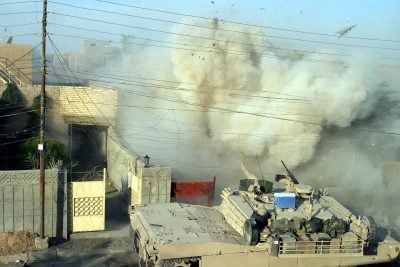
What Is in Store for Iraq and the Broader Middle East?
Amro Allan, Global Research 14 Mar 2021
It is still early to be certain what strategy the new US administration will adopt in the Levant. Yet the recent actions of the US and its allies can give a good indication of what is in store for the region. Especially when those actions reinforce the validity of some intelligence obtained from a well-informed source, and when they fit the facts on the ground.
For the past ten years, the US and its allies have been engaged in a war against Syria. However, this war did not achieve its main strategic objective. On the contrary, Syria has become involved with the Axis of Resistance more than ever. And despite the pitfalls in some places, and slow achievements in others, the Axis of Resistance has gained more influence in the Levant overall. One aspect of this is that the route from Tehran to Beirut, through Baghdad and Damascus, is solidifying every day. Securing this route can greatly facilitate trade and economic collaboration between those four capitals- something that will enhance the living situation of the people of those countries and fortify their resilience.
The US understands the strategic challenge that this poses to its influence in the Levant and indeed in West Asia in general; as it has been expressed in many pro-US-articles.
A vital result of securing this route is the leverage it provides to the Axis of Resistance to overcome the ‘maximum pressure’ policy which the US has been pursuing of late, not just against Iran, but also against Syria using the ‘Caesar Act’. And because the events of the past few years exposed the unreadiness of the US to engage in an all-out war against Iran and its allies, that leaves the ‘maximum pressure’ policy as the only cost-effective card for the US to play against the Axis of Resistance.
Another result of the events of the last ten years in the Levant is that the Iraqi and Syrian arenas have become more interconnected. Hence, the aftershocks of any change in the political balance in one domain will be felt in the other. And because of the Russian presence in Syria, as well as the strategic alliance between Russia and the Syrian government, the US margin of manoeuvre within Syria is more constrained than it is in Iraq. Thus, it appears that the new strategy of Joe Biden’s administration is to work towards changing the status quo within Iraq to the advantage of the US, through targeted assassinations and special operations. It seems that the end goal is to strengthen the US allies within the Iraqi ruling class, benefiting from the volatile Iraqi political situation, so as to align Iraq with the US stance in the region.
This strategy, if it succeeds, will achieve two objectives for the US: breaking the Baghdad link in the afore-mentioned route chain, and tightening the economic sanctions imposed on Syria. The latter objective can then be used to force the Syrian government to make political concessions in the upcoming presidential elections and in the negotiations with the ‘separatists Kurdish factions’ in the east of the Euphrates, where the Syrian oil and wheat fields lie.
The latest US airstrike on the Iraqi security forces, the ‘Popular Mobilization Forces’ (PMF), is believed to be in this context despite the US pretexted justification. Choosing to bomb a position on the Syrian Iraqi borders and in the vicinity of a vital Syrian Iraqi crossing point cannot be at random.
Another sign of the US intent to change the political balance in Iraq is the recent
lengthy interview with Raghad Saddam Hussein on the Saudi-owned news channel Al-Arabiya (the Saudis are a strategic US ally). In this interview, she spoke about internal Iraqi affairs, attacked what she called Iranian influence in Iraq, and refused to rule out a possible future role in Iraqi politics.
A well-informed source confirmed the existence of such a plan: ‘The US has put into action a new plan to shift the balance in Iraq to their advantage through targeted assassinations and inciting strife within Iraq. This plan is to be carried out in collaboration with some top positions in the current Iraqi government, and the Iraqi Ba’ath party’ the source added. On this question, it is worth noting the since-retracted statement by Pentagon Press Secretary John F. Kirby that Iraqi authorities helped the US to carry out ‘successful strikes’ on Syria’s territory in February, and in spite of the Iraqi Defence Ministry denying any knowledge of this airstrike beforehand.
If the next few weeks prove this analysis to be true, then it would be logical to assume that the Axis of Resistance will take countermeasures, and this would very likely raise the stakes in an already heightened situation in a volatile region.
Amro Allan, Palestinian writer and Political researcher
Amro Allan ( amro@amrobilal.net), is an independent Palestinian writer and Political researcher. He publishes in various Arabic news outlets, some of which are Al-Akhbar newspaper, Rai Al-Youm, and Arabi 21.












No comments:
Post a Comment